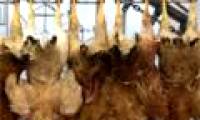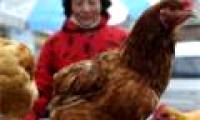
China is strengthening measures to prevent the spread of H7N9 bird flu, which has killed dozens of people, including the ban on the sale of live poultry.

Chinese scientists have published a new discovery that a variant of the H7N9 avian influenza virus can bind to receptors - the receptor from the external environment - of humans.

The US Centers for Disease Control and Prevention (CDC) said it is gathering more information and is beginning to prepare to develop a vaccine against H7N9.

According to Xinhua on April 6, China approved Peramivir, a new anti-flu drug that is believed to effectively treat the H7N9 bird flu virus.

A 4-year-old patient in Shanghai, the only case of health recovery after determining infection with influenza virus H7N9 treated with Tamiflu, a drug to prevent influenza A

The H7N9 influenza virus strain has a combination of genes between East Asian wild birds and farmed chickens in Shanghai city, Zhejiang province and China's Jiangsu province.

A 4-year-old boy in Beijing, China tested positive for the H7N9 influenza virus, identified as a host of the deadly H7N9 influenza virus, Xinhua reported on April 15.

The two deaths were all in Shanghai, China. Among them, there was an 87-year-old grandfather, who began to show symptoms on February 19 and died 8 days later.

The number of H7N9 bird flu cases in China has increased to 7 people, of which 2 have died. Concerned about possible disease in Vietnam, the Ministry of Health requires units to

On April 4, the Prime Minister made a public request to the sectors to drastically prevent smuggled poultry, to prevent H7N9 infection from spreading to China. The Ministry of
 China is strengthening measures to prevent the spread of H7N9 bird flu, which has killed dozens of people, including the ban on the sale of live poultry.
China is strengthening measures to prevent the spread of H7N9 bird flu, which has killed dozens of people, including the ban on the sale of live poultry. Chinese scientists have published a new discovery that a variant of the H7N9 avian influenza virus can bind to receptors - the receptor from the external environment - of humans.
Chinese scientists have published a new discovery that a variant of the H7N9 avian influenza virus can bind to receptors - the receptor from the external environment - of humans. The US Centers for Disease Control and Prevention (CDC) said it is gathering more information and is beginning to prepare to develop a vaccine against H7N9.
The US Centers for Disease Control and Prevention (CDC) said it is gathering more information and is beginning to prepare to develop a vaccine against H7N9. According to Xinhua on April 6, China approved Peramivir, a new anti-flu drug that is believed to effectively treat the H7N9 bird flu virus.
According to Xinhua on April 6, China approved Peramivir, a new anti-flu drug that is believed to effectively treat the H7N9 bird flu virus. A 4-year-old patient in Shanghai, the only case of health recovery after determining infection with influenza virus H7N9 treated with Tamiflu, a drug to prevent influenza A
A 4-year-old patient in Shanghai, the only case of health recovery after determining infection with influenza virus H7N9 treated with Tamiflu, a drug to prevent influenza A The H7N9 influenza virus strain has a combination of genes between East Asian wild birds and farmed chickens in Shanghai city, Zhejiang province and China's Jiangsu province.
The H7N9 influenza virus strain has a combination of genes between East Asian wild birds and farmed chickens in Shanghai city, Zhejiang province and China's Jiangsu province. A 4-year-old boy in Beijing, China tested positive for the H7N9 influenza virus, identified as a host of the deadly H7N9 influenza virus, Xinhua reported on April 15.
A 4-year-old boy in Beijing, China tested positive for the H7N9 influenza virus, identified as a host of the deadly H7N9 influenza virus, Xinhua reported on April 15. The two deaths were all in Shanghai, China. Among them, there was an 87-year-old grandfather, who began to show symptoms on February 19 and died 8 days later.
The two deaths were all in Shanghai, China. Among them, there was an 87-year-old grandfather, who began to show symptoms on February 19 and died 8 days later. The number of H7N9 bird flu cases in China has increased to 7 people, of which 2 have died. Concerned about possible disease in Vietnam, the Ministry of Health requires units to
The number of H7N9 bird flu cases in China has increased to 7 people, of which 2 have died. Concerned about possible disease in Vietnam, the Ministry of Health requires units to On April 4, the Prime Minister made a public request to the sectors to drastically prevent smuggled poultry, to prevent H7N9 infection from spreading to China. The Ministry of
On April 4, the Prime Minister made a public request to the sectors to drastically prevent smuggled poultry, to prevent H7N9 infection from spreading to China. The Ministry of









 Why are calico cats always female?
Why are calico cats always female? How was the Pyramid of Khufu built? Scientists have finally found out the truth!
How was the Pyramid of Khufu built? Scientists have finally found out the truth! How rare are rare earths really?
How rare are rare earths really? Never-before-seen scene on Mars in this photo that took NASA 3 months to capture
Never-before-seen scene on Mars in this photo that took NASA 3 months to capture 100 million year old fossil of cannibalistic mosasaur
100 million year old fossil of cannibalistic mosasaur Revealing the fall of the Hittite empire and the fear of people today
Revealing the fall of the Hittite empire and the fear of people today The Irish Giant: The Most Controversial Tragedy in British History
The Irish Giant: The Most Controversial Tragedy in British History Find out what created the most bizarre super objects in the universe
Find out what created the most bizarre super objects in the universe